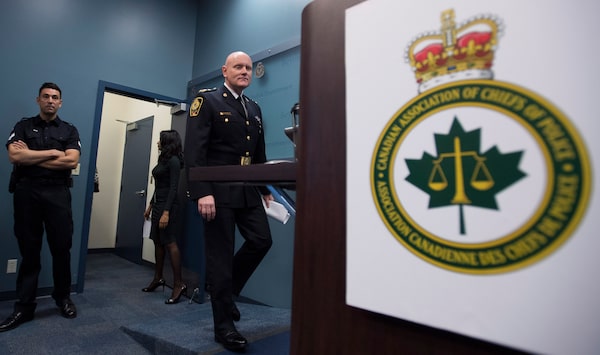Part of cannabis laws and regulations

Chief Constable Adam Palmer, president of the Canadian Association of Chiefs of Police, arrives for a news conference in Vancouver, Oct. 15, 2018.JONATHAN HAYWARD/The Canadian Press
The head of an organization representing Canada’s police chiefs says he does not expect a national dragnet on unlicensed cannabis dispensaries after marijuana becomes legal on Wednesday.
That means some of the 100 or so illegal stores across Vancouver and Toronto will likely continue to operate, at least until provincial cannabis agencies now tasked with enforcing the new laws, many of which were only recently formed, begin gathering intelligence and start shutting them down.
Vancouver Chief Constable Adam Palmer, president of the Canadian Association of Chiefs of Police, which represents the leadership of almost all the departments across the country, says he has not heard of any law-enforcement agencies planning to raid illegal dispensaries the day cannabis becomes legal.
“Oct. 17 is going to come and then Oct. 18 and then Oct. 19, and you’re probably not going to see a whole big change with regard to what the police are doing or what anybody else is doing,” Chief Palmer told reporters at a news conference in Vancouver on Monday. “Marijuana is important, but it is not the most important thing going on in the country right now. Fentanyl, for example, kills 11 Canadians a day. Marijuana certainly doesn’t.”
Toronto police spokesperson Meaghan Gray on Monday said it will be business as usual for the force, which made headlines two years ago for raids on half the city’s approximately 100 dispensaries.
“They will continue to be illegal after October 17th and we will focus our efforts on locations which are subject to community complaints and other concerns,” she said in an e-mailed statement.
Opinion: Boomers, remember the real – and perceived – harms of cannabis use
Explainer: Canadian cannabis will be legal on Wednesday. Read this first
Police forces across the country are expected to defer most of the enforcement of the cannabis laws to the provincial agencies, which – much like liquor inspectors – will be able to seize products, close stores and issue fines.
However, Chief Palmer said, police departments are focused and ready to stop cannabis-impaired drivers and illicit grow-ops, despite concerns that forces are reluctant to roll out the widespread use of cannabis-screening devices this week.
He said police are adept at detecting impairment without these devices, with 13,000 officers trained in standard field sobriety testing and another 833 certified drug-recognition experts. Over the next five years, those totals are expected to rise to 20,000 and 1,333 respectively.
B.C. Public Safety Minister Mike Farnworth, who handles the marijuana file, confirmed on Monday that only one retail store – in Kamloops and run by the government – will open this week. He said other outlets will follow in the coming months, and as they come online, enforcement will ramp up against illegal dispensaries.
“What we are doing is putting in place a legal cannabis regime,” Mr. Farnworth told a news conference on Monday. “I’ve said it is not going to happen overnight and it is going to take some time.”
He expects some marijuana dispensaries to close by Wednesday in efforts to improve their chances to get licences.
Courtland Sandover-Sly, a financial consultant on Vancouver Island for underground dispensaries hoping to become legal, said about half these illicit operators will shut down while they pursue licences and the rest will sell unregulated products as long as they can. He estimates it will take B.C., home to thousands of people linked to the underground cannabis sector, two to three months to begin investigating them.
“Without enforcement mechanisms in place, it will be very difficult for the police to help the province in controlling the amount of dispensaries that are out there," he said. “And so at least until the province has their inspectors in place and has started the prelicensing inspections, enforcement probably won’t be as high as it could be.”
Alberta, the province expected to have the most licensed retail outlets open at the outset of legalization, said it has set aside $11.2-million over the next two years to help municipalities cope with increased policing costs as well as local bylaw enforcement. Finance Minister Joe Ceci said the impact of cannabis legalization will be felt locally.
The associations representing Alberta’s rural and urban municipalities said they were disappointed with the level of funding and the province’s decision to give the grants only to 52 communities that have more than 5,000 people and local police forces.
Edmonton Mayor Don Iveson said the funding is insufficient. He said legalized cannabis could cost Alberta’s capital about $12-million annually for additional policing and bylaw enforcement.
With reports from Justin Giovannetti in Calgary and The Canadian Press
Available now: Cannabis Professional, the authoritative e-mail newsletter tailored specifically for professionals in the rapidly evolving cannabis industry. Subscribe now.
 Mike Hager
Mike Hager